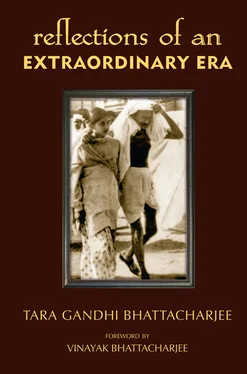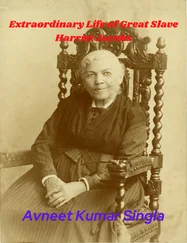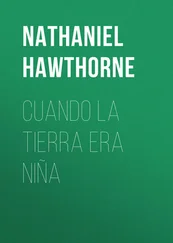That day in front of that house, Mother’s words echoed in my thoughts. I always saw Mother being a good hostess in the best Indian tradition. Despite all the responsibilities, she always had time for us.
In the ashram there was a round temple in front of the house. That day my eyes automatically sought out the temple. Its creation is part of my first conscious memory. A painter from Gujarat came to adorn the walls of this temple when it was built. He told my brother Mohan and me very affectionately that he needed our help with the painting. ‘I will draw and paint on the walls from atop a stool or steps. You please hold my colour palette. I can then bend and take the colours I need.’ We were thrilled at the idea. Father was happy too. Mohan and I would stand there helping the painter. We used to call him Bhatt-ji. The entire ashram was excited about the construction of the temple. Bapu-ji was to come for its inauguration. Assisting Bhatt-ji was an extraordinary experience for us. Children feel rewarded when entrusted a responsibility with affection and trust, and that experience becomes a warm memory as they grow up. Children are very intuitive. People’s natural considerations touch them in a way that they never forget.
The temple was complete. I don’t remember the day of the inauguration. Recently I came across an old photograph in which Bapu-ji has a small girl in his lap wrapped up in a sheet and there is another younger child sitting next to him. I think the picture is from the inauguration of the temple.
Leaving behind the rural ambience of the ashram, I naturally took with myself, in my memory, some people and families. Annaro, a village girl who used to help mother in and around the house; Mangal Bhai, the carpenter in the ashram; and a teacher’s family of Indian Tamil origin from Malaysia – none of us can ever forget these people. Annaro had a rustic charm, Mangal Bhai was friendly, and the Malaysian family was rather modern for the times. These loving people were my first introduction to society outside of family, and I believe one’s first experience of the world outside home shapes one’s personality. In my seventh decade today, I understand that these people, my first friends in the world outside home, were extraordinary in their ordinariness.
Even after leaving the ashram, we used to nag our parents to take us back every week to meet these old friends. As soon as we reached the ashram, Mangal Bhai would come running to meet us. He would say, ‘Tara, Mohan, you still come to visit us, but gradually you will stop coming. Don’t forget us.’ Mangal Bhai’s words, along with our own displacement, had a strong effect on our minds. Till many years later, I continued comparing every place to life in the ashram.
So, yes, coming back to the point, I was rooted to the spot in front of our old house in the Harijan Colony, caught in a moment from memory, overcome with old sounds and smells. Standing there I saw Kasturba. I could clearly hear her words: ‘Wash your hands and eat. Oh my God, your clothes are so…’ The dream broke. I was looking at my clothes. They were probably not as clean as Ba would have liked them to be. And yes, I was hungry. And then another reality broke my bubble. From behind me came a voice changing the rhythm of my internal music: ‘Let’s go, Tara. The meeting is about to start.’ There was a meeting in the ashram in memory of the Late Hari-ji.
These days I constantly feel a strange curiosity, a strange excitement. I am searching for the unknown supreme power in the absolute beauty of the known powers of a mother.

Ba would come and stay with us in the Connaught Place flat, but Bapu-ji never managed. For Bapu-ji to stay anywhere, it was essential to organize a place for public gatherings. After coming to the Hindustan Times flat from the ashram, I would picture Ba and Bapu-ji in Sewagram, Bardoli Ashram and in the Aga Khan prison. My memories of the Bardoli Ashram are very blurry. In the Sewagram Ashram, we lived in a mud hut. In the night, we would sleep outside under a clear sky. With the first rays of the sun, Bapu-ji would come smiling to wake us up. The place always smelled of the Harsingar (Nyctanthes flowers). There were many coral trees in the ashram and sweet-smelling flowers covered the ground beneath the trees. Mother used to pick those flowers. She would explain to us that just before the first rays of the sun appeared, these flowers would by themselves fall off the trees and we were thus saved the violence of plucking them from the branches. She would tell us that we could even take these flowers for Bapu-ji because they were procured non-violently and were fit for an offering to him. She would pick the flowers while we would enjoy a morning walk with Bapu-ji.
In Sewagram, everyone would eat together, sitting on the floor in a line. Before the meal, a small Sanskrit shloka was chanted. Constantly hungry from all the running and playing in the open environs of the ashram, that short prayer seemed rather long to me. The food in the ashram tasted incredible. It is today that I understand well that prayer. It has a beautiful meaning: May He (God) protect us. May He use us. May both of us (Master-disciple) be vigorous. May we never become enemies. Om. Shanti. Shanti. Shanti.
The open clear skies of Sewagram, the smell of the earth, the village hut, the touch of pure khadi , Bapu-ji’s enchanting personality, a morning walk with him, and then the Harsingar flowers – I see these memories weaving an endless yarn on the chakra of time.
Ba and Bapu-ji were imprisoned in a wing of Aga Khan Palace in Pune along with some of their companions. My siblings and I would go there with our parents to meet them; we went there with as much enthusiasm as we would go to meet them at the railway station or in Sevagram Ashram. We would be so impatient to meet our grandparents that the journey from Delhi to Pune seemed endless. In Pune, we would stay in a two-room inn near the station. Mother would cook for us in a small kitchenette (probably for the lack of proper arrangement of food at the inn), and then we would be off to the Aga Khan Palace in a tonga. Before entering the palace, permission had to be sought from an English officer for the visit. Father would go to the officer’s house to seek permission. This entailed a long wait for us in the tonga outside, but Father never came back without the permit. Ba and Bapu-ji would be so thrilled to see us that the sombre atmosphere there would be instantly dispelled.
A ten-year-old girl lay quietly with her grandmother on a cot. She had come with her parents and younger brothers to meet her grandparents. Even though she had been suffering from a long illness and was extremely weak, the grandmother’s sari, her sheets and pillows were redolent of love and that special feeling that was unique to her and made the granddaughter feel secure. Every touch was familiar, but why was there a note of farewell in her grandmother’s voice? It’s amazing how children can always tell.
There was no anguish in her farewell; just an acceptance of nature’s decision. ‘Why is Dadi looking at me thus?’ thought the child. ‘Is she going to leave us? How will I live without her love?’ The grandmother’s feeble hands caressed the girl’s head with a tenderness she knew too well.
Конец ознакомительного фрагмента.
Текст предоставлен ООО «ЛитРес».
Прочитайте эту книгу целиком, купив полную легальную версию на ЛитРес.
Читать дальше













